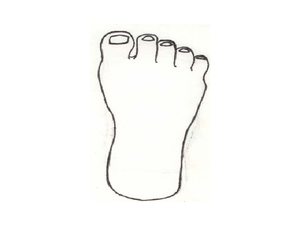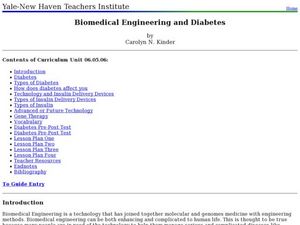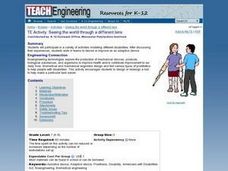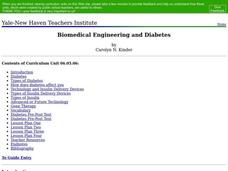Curated OER
Biomedical Engineering: Wacky Shoes
Students create 'wacky' shoes as a part of a biomedical engineering activity. In this bioengineering lesson, students investigate old shoes cut in half and discuss the purpose of each shoe layer. Students use a shoe template to design...
Curated OER
Biomedical Engineering and Diabetes
Students compare and contrast the three types of diabetes. In this technology instructional activity, students identify the causes of this disease. They investigate ways to deliver insulin to the body and present their findings in class.
Curated OER
Technology: Biomedical Engineering
Students participate in activities simulating various disabilities. After discussions, they work in teams to devise or improve on adaptive devices for people with disabilities. They include drawings of the tools they design and explain...
Curated OER
Broken Bones
After reading about biomedical engineering and properties of materials, collaborative groups design a cast for setting a broken bone. They test for stability and mass, and then communicate their invention by creating a poster. This...
Curated OER
TE Activity: Broken Bones
Students examine the discipline of biomedical engineering or bioengineering. They complete worksheets by participating in reading background information and completing a hands on activity. They design a prototype of a cast to set a...
Curated OER
Biomedical Engineering and Diabetes
Young scholars discuss diabetes, it causes, and old and current technology to control the disease. They discuss biomedical engineering and new technology to control the disease. The examine the various types of insulin delivery systems...
Curated OER
Build a Prosthetic Device
Seventh graders become familiar with biomedical engineering. In this prosthetic device lesson, 7th graders consider the needs of a prosthetic device to help a specific person's characteristics. Students build a prosthetic device.
Curated OER
Biomedical Engineering and Quality of Life Improvements
Students complete an observational or natural science experiment. They do systematic and experimental work using experiments that have been done by others. They research their hypothesis and gather information from several sources. They...
Teach Engineering
Tell Me Doc—Will I Get Cancer?
Can you beat the odds of cancer? In the first installment of a seven-part series, future biomedical engineers consider how to detect and diagnose cancer. An article on biosensors provides useful information toward this goal.
Teach Engineering
Abdominal Cavity and Laparoscopic Surgery
Get to know the human body from the inside out. The first lesson plan in a series of 10 introduces the class to the abdominopelvic cavity. Biomedical engineers need to understand the region of the body as they develop and improve...
Curated OER
Bone Fractures and Engineering
Students examine bone fractures and the role that engineers play in repairing them. In this biomedical engineering lesson students describe the factors that engineers consider when designing devices.
Curated OER
Medical Instrumentation
Middle schoolers analyze how medical devices that help the human body function. They work in pairs or groups to draw multiple views of the medical device and describe how engineering is used by biomedial engineers.
DiscoverE
Nanomedicine
Cancer patients need as much help as they can get. Future engineers design a system that delivers cancer medicine to the lungs but doesn't harm other organs. Using ferrofluids and iron particles, they test out their delivery systems.
Curated OER
Using Ionising Radiation in Medicine
This is an information-intense presentation for any science class you might be teaching that will study ionising radiation. The material is specific to cancer diagnosis and treatment, and one of the forty-two slides also touches on using...
Curated OER
Activity: Slinkies and Magnetic Fields
Your advanced physics class will appreciate this instructional activity in which they use magnetic field sensors to determine the relationship between the number of turns per meter of a solenoid and the magnetic field produced. The...
Teach Engineering
Preconditioning Balloons: Viscoelastic Biomedical Experiments
What does stretching a balloon have to do with equilibrium? Groups explore preconditioning by stretching a balloon to a point of equilibrium. They then measure the amount of force required to stretch the balloon to the same point several...
Teach Engineering
Engineers Love Pizza, Too!
Help overcome challenges in eating pizza. Scholars work in groups to design a device that assists a physically handicapped person eat pizza. They build a prototype of such a device to test their designs before building. To finish, groups...
Teach Engineering
Complex Networks and Graphs
Show your class how engineers use graphs to understand large and complex systems. The resource provides the beginnings of graph theory by introducing the class to set theory, graphs, and degree distributions of a graph.
Teach Engineering
Nanotechnology and Cancer Treatments
Information on the biomedical use of nanotechnology, specifically in the detection and treatment of cancer, is the focus of a lesson that seems like it is out of a science fiction novel. Pupils learn about electrophoresis, which is used...
Teach Engineering
Automatic Floor Cleaner Computer Program Challenge
Have your class use the engineering design process to program a vacuum robot. Using computer engineering concepts, teams program an automatic floor cleaner to traverse designated patterns.
Teach Engineering
Portable Wheelchair Ramp Challenge
Ramp up the engineering design process in your classroom with an activity that challenges teams to design, build, and test a small-scale portable wheelchair ramp. The class develops design requirements, and teams test their designs using...
Teach Engineering
Off-Road Wheelchair Challenge
Challenge your class to use their understanding of the engineering design process to design and build a small-scale, off-road prototype for an assistive technology device. Teams select materials to build their scale models, and, using...
Teach Engineering
Viscous Fluids
Elasticity and viscosity. Help your class understand the similarities and differences with an introduction to viscous fluids. After describing four types of fluid behaviors: shear thinning, shear thickening, Bringham plastic, and...
Teach Engineering
Tissue Mechanics
Engage your class by showing them how silly putty and human tissues are alike. Pupils learn more about tissue mechanics by reflecting upon their experiences with silly putty. The lesson covers collagen, elastin, and proteoglycans and...

























